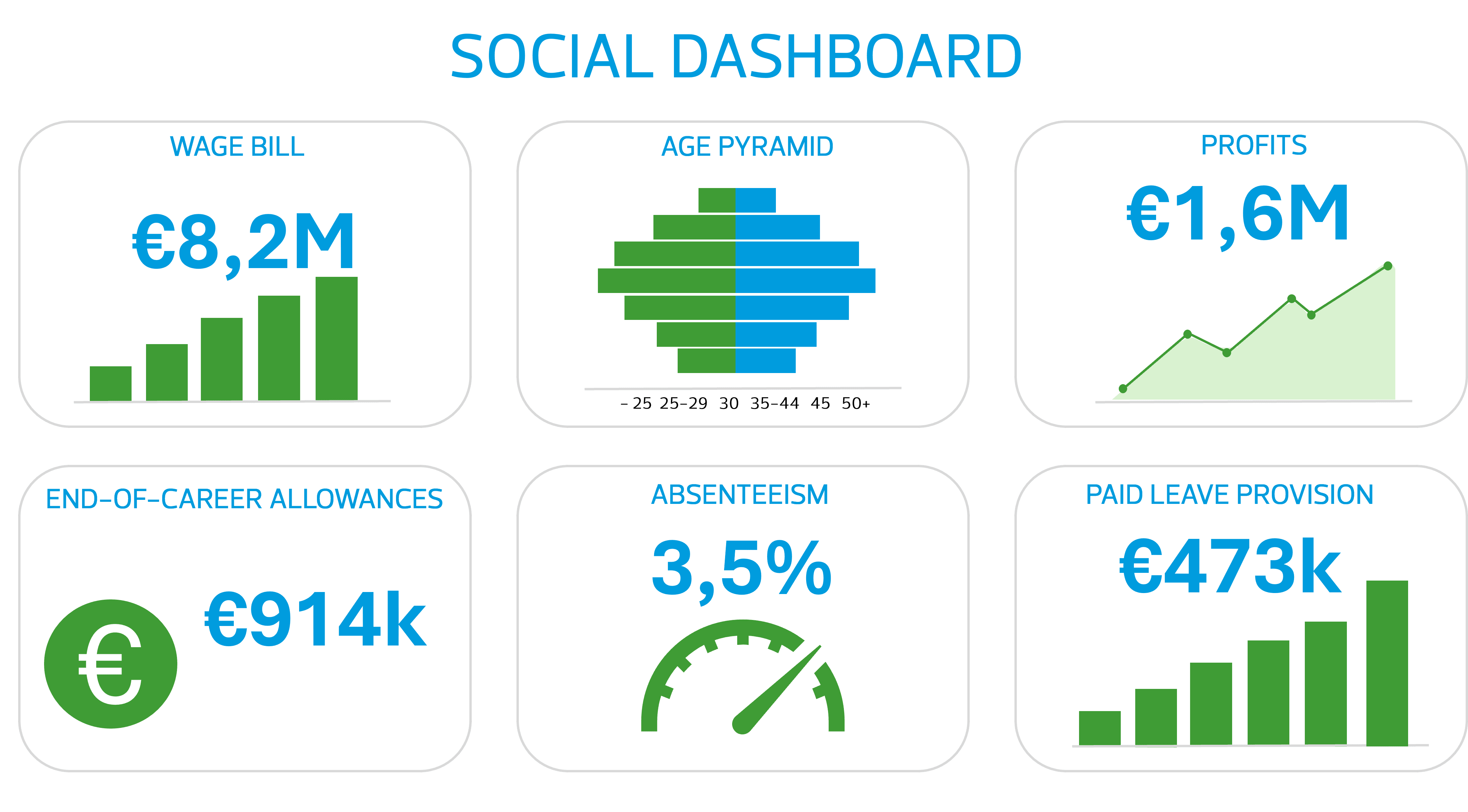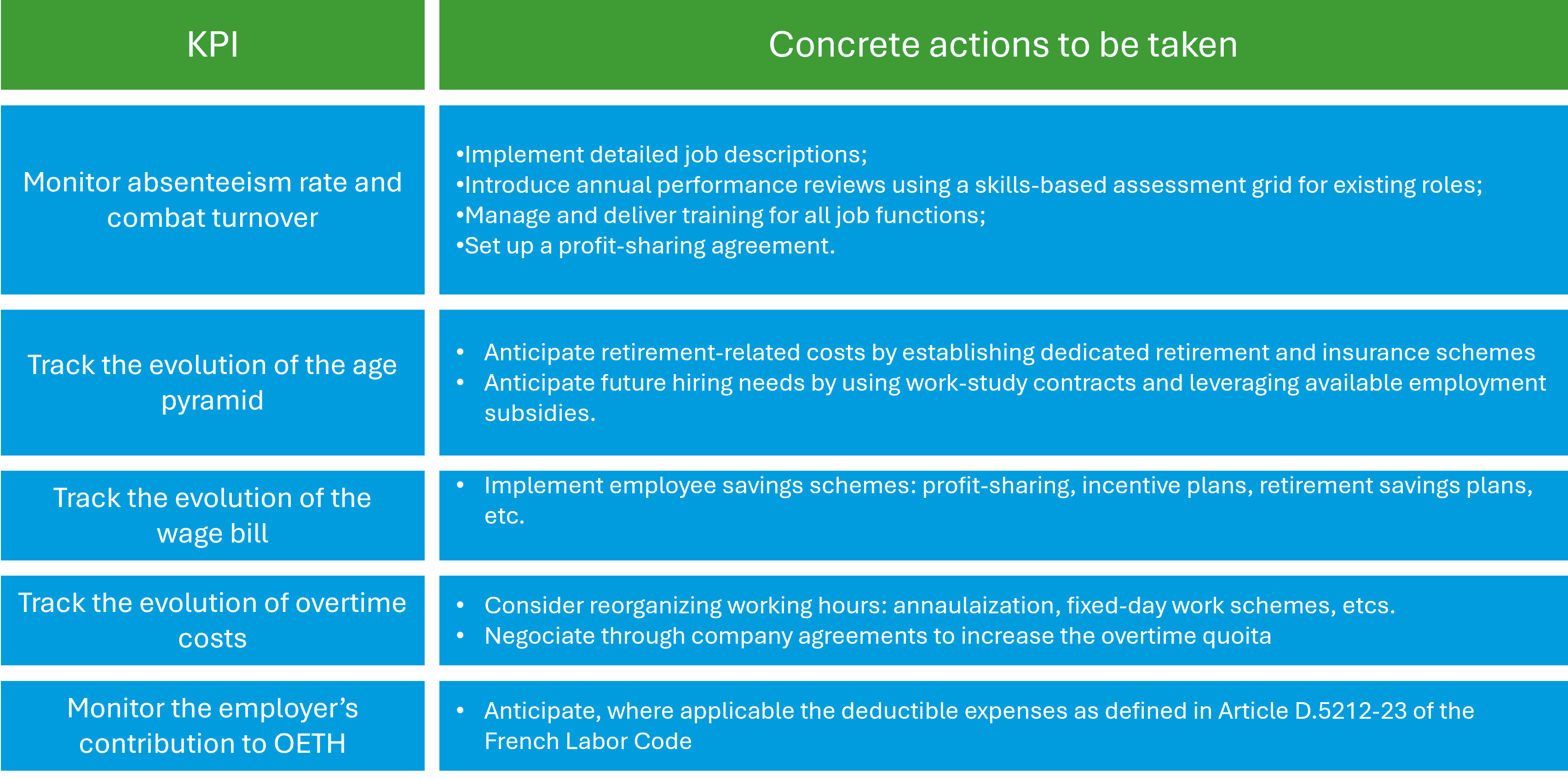Key takeaways
As part of human resources management, social information (notably data stemming from payroll management) plays a key role in the success of a company.
Indeed, it allows business leaders not only to monitor but, above all, to optimize their organization’s performance.
In this context, collecting, compiling, and analyzing the "right" social information are essential "building blocks" in constructing a strategic approach that can significantly assist decision-making for any manager, regardless of the size of their company.
Furthermore, beyond enabling informed and strategic decisions, this data also responds—for certain companies (depending on their workforce)—to obligations set out in the Labor Code concerning employee representatives, and also to third parties such as the labor inspectorate.
Ultimately, regardless of company size, mastering social information can represent an advantage (including a competitive one) for any business leader. Gaining insight into a company’s performance often involves clarifying its key performance indicators or KPIs.
This approach can be summarized as follows: rather than endure legal constraints, companies should rely on the informational data they already possess to foster optimal working conditions for employees—conditions that will lead to continuous productivity improvement and, thus, increased profitability.
In this article, our expert explains why "useful" social information is essential for managing and sustaining long-term business performance and outlines the benefits any manager can gain from leveraging social data.
Companies with 50 or fewer employees: Why take ownership of social information management?
In companies with 50 or fewer employees, it should be noted that the Labor Code does not impose specific communication obligations regarding social information to employee representatives—unlike companies with more than 50 employees that have a Social and Economic Committee (CSE).
However, collecting, organizing, using, and monitoring social information remains strategic for business leaders. Indeed, payroll software alone can already provide a wealth of information.
In light of this, a well-structured social dashboard can be a valuable tool for making informed human resources decisions.
Creating a Social Report or a Social Dashboard: What’s the Difference?
First, it’s important to distinguish between the "social report" and the "dashboard"—two tools used to assess the social status of a company, but with different objectives.
The social report is an annual document that provides an overview of the company’s social situation at the end of the fiscal year (typically calendar or accounting year). It compiles data on workforce composition, training actions, etc.
By contrast, the social dashboard is a regular monitoring tool (typically monthly or quarterly) of key indicators (KPIs) based on HR data, including payroll management. It offers a dynamic, real-time view of social performance.
Example of social dashboard

Using Social Information: What Are the Benefits?
A social dashboard helps the business leader analyze social data and measure the performance of their human capital. It can provide an overview (depending on the chosen frequency) of pre-defined indicators, enabling proactive management of the resulting actions.
Some KPIS and actions to be taken as example

Thanks to these indicators, it's possible to assess the effectiveness of HR initiatives, whether related to training, compensation policies, or workplace well-being efforts.
To sum up
The dashboard should pursue clear and understandable objectives. A few simple examples include:

This dashboard, combined with a social report, can:
- Permettre le partager des données claires et objectives sur la situation sociale de Enable the sharing of clear and objective data on the company’s social status;
- Provide a positive image of the company by offering a serious overview to a potential buyer, before possibly starting a more in-depth audit like a due diligence process
Proposed Methodological Approach

In conclusion, establishing a social dashboard, even in a company with fewer than 50 employees, allows for efficient monitoring of the company’s social performance, anticipation of common daily challenges, and strategic decision-making based on objective data. This monitoring, though not mandatory, contributes to the continuous improvement of working conditions while enhancing HR management.
-> Key indicators as support for implementing a profit-sharing agreement
Another significant benefit is that the indicators developed (and thoughtfully defined in advance) can help business leaders implement a profit-sharing agreement tailored to the company's most pressing needs, making it a “win-win” approach.
It is worth noting that profit-sharing is an optional employee savings plan intended to involve employees in their company’s performance. It is covered in the Labor Code under Articles L3311-1 to L3315-5.
Statutory profit-sharing may serve as a serious alternative to the value-sharing bonus (PPV), which has become more expensive (since January 1, 2025) for companies considering granting it to employees earning less than 1.6 times the annual minimum wage.
Companies with 50 or more employees: What are the obligations?
Implementing the Economic, Social, and Environmental Database (BDESE)
The BDESE gathers all the information necessary for the recurring consultations and information-sharing the employer must provide to the Social and Economic Committee (CSE) (Labor Code art. L. 2312-18).
It is mandatory only in the context of the CSE’s duties in companies with 50 or more employees (Labor Code arts. L. 2312-18 and L. 2312-36).
Its organization, structure, and content are defined by a majority company agreement (without referendum) or, in the absence of a union delegate, by an agreement between the employer and the CSE (Labor Code art. L. 2312-21). Failing an agreement, the fallback provisions of the Labor Code apply (Labor Code arts. L. 2312-17 to L. 2312-23 and L. 2312-36).
In all cases, mandatory “public policy” provisions must be respected (Labor Code art. L. 2312-17 et seq.).
The BDESE must include various sections covering at a minimum the following topics (Labor Code art. L. 2312-21):
- Social investment ;
- Tangible and intangible investments ;
- Gender equality in the workplace ;
- Equity capital ;
- Debt ;
- All elements of employee and executive compensation ;
- Social and cultural activities;
- Financier compensation;
- Finacial flows of the company ;
- Environmental consequencesof the company's activity
Certainly, the requirements for collecting and providing social information to the CSE (as outlined in the Labor Code) may appear burdensome for affected companies.
However, these companies can begin by mapping out their social information (as companies with fewer than 50 employees are advised to do—see above).
In other words, this first step toward the BDESE can foster better social dialogue with employee representatives and act as a springboard for deploying all legally required information.
What Are the Penalties?
The absence of a BDESE or missing information exposes the employer to penalties and may even jeopardize planned projects. Therefore, special attention must be paid to the economic and social documentation made available to the CSE for the exercise of its duties.
Indeed, failing to implement or update a BDESE may expose the employer to the offense of obstruction (Labor Code arts. L. 2317-1 and L. 2146-1).
For the CSE’s economic responsibilities, note that the law or a collective agreement may require the communication or availability of certain documents. The consultation period only begins once this communication has occurred (Labor Code arts. R. 2312-5 and R. 2312-7).
Focus on CSE’s Obligations Concerning Its Own Activities
The CSE must also produce an activity and financial management report.
This report presents qualitative information about the CSE’s activities and financial management, helping elected representatives and employees better understand its accounts (Labor Code arts. L. 2315-68 and L. 2315-69).
What About Companies With More Than 300 Employees?
Article L2312-28 of the Labor Code specifies that employers regularly employing at least 300 employees must prepare a social report.
The social report summarizes key quantitative data that allows assessment of the company's social situation, records completed actions, and measures changes over the past year and the two preceding years (Labor Code art. L 2312-30, para. 1).
These data are grouped into 8 themes (Labor Code art. L 2312-30, para. 2):
• Employment;
• Compensation and additional expenses;
• Health and safety conditions at work;
• Other working conditions (working time, organization, physical conditions, occupational health, etc.);
• Training;
• Professional relations;
• Number of seconded employees and seconded workers received;
• Living conditions for employees and their families if dependent on the company.
According to Article L2312-31 of the Labor Code, social report information is available to any employee upon request.
It is made available to the labor inspectorate control officer (Art. L. 8112-1) along with the CSE’s opinion within fifteen days of the CSE meeting.
The social report is included in the BDESE, as allowed by law (Art. L2312-28).
• https://www.legifrance.gouv.fr/codes/article_lc/LEGIARTI000035627360
• https://www.legifrance.gouv.fr/codes/article_lc/LEGIARTI000036262535
• https://www.legifrance.gouv.fr/codes/article_lc/LEGIARTI000006901653
• https://www.legifrance.gouv.fr/codes/article_lc/LEGIARTI000035634273
• https://www.legifrance.gouv.fr/codes/article_lc/LEGIARTI000043975329
• https://www.legifrance.gouv.fr/codes/article_lc/LEGIARTI000037385879
• https://www.legifrance.gouv.fr/codes/article_lc/LEGIARTI000043975325
• https://www.legifrance.gouv.fr/codes/article_lc/LEGIARTI000048533629
• https://www.legifrance.gouv.fr/codes/article_lc/LEGIARTI000044605436
Our team of HR consulting and support experts is here to understand your strategy, challenges, and economic environment. We offer a multidisciplinary, agile, and tailor-made service.
Discover our HR, Social and payroll consulting service.





